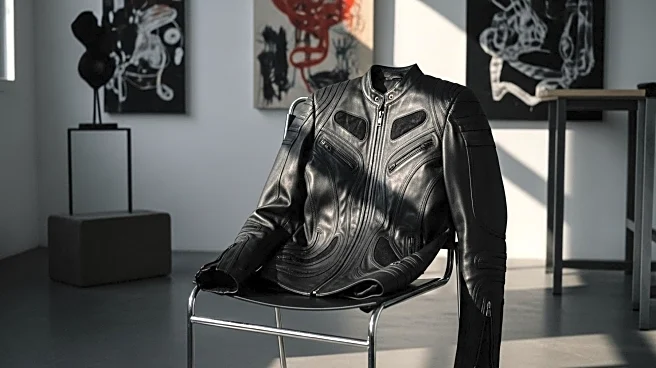What's Happening?
Rick Owens, a renowned fashion designer, is currently showcasing a retrospective at the Palais Galliera in Paris. Known for his provocative designs, Owens has built a career challenging societal norms and promoting individuality. His infamous 'free willy' men's show in 2015, which featured visible male nudity, was criticized by Karl Lagerfeld but celebrated by Owens as a form of playful provocation. Owens has spent over 30 years in the fashion industry, rebelling against intolerance and becoming a cult fashion hero. He emphasizes the importance of provocateurs in society and aims to inspire others through his work. Owens' career has been marked by a slow burn, supported by his partners Luca Ruggeri and Elsa Lanzo, who have helped him maintain his unique voice in the industry.
Why It's Important?
Rick Owens' career highlights the role of fashion as a medium for challenging societal norms and promoting individuality. His provocative designs have sparked conversations about masculinity, art, and fashion's role in society. Owens' success demonstrates the importance of creative freedom and the impact of long-term partnerships in the fashion industry. His retrospective in Paris serves as a testament to his influence and the enduring appeal of his designs. Owens' approach to fashion, which combines artistry with social commentary, continues to inspire new generations of designers and fashion enthusiasts.
What's Next?
Rick Owens expresses a sense of completion with his Paris retrospective but remains committed to his work. He plans to continue creating and exploring new ideas, emphasizing the importance of quality and longevity in fashion. Owens is focused on aging gracefully and adapting his style to new phases of his career. He aims to maintain his sense of purpose and urgency, driven by the cyclical nature of fashion shows and collections. Owens' future endeavors will likely continue to challenge conventions and inspire others in the fashion industry.
Beyond the Headlines
Rick Owens' work raises questions about the ethical and cultural dimensions of fashion. His provocative designs challenge traditional notions of masculinity and beauty, encouraging viewers to reconsider societal norms. Owens' emphasis on quality and longevity in fashion contrasts with the industry's focus on consumption and disposability. His career serves as a reminder of the importance of creative freedom and the impact of long-term partnerships in sustaining artistic vision. Owens' influence extends beyond fashion, inspiring broader conversations about individuality and self-expression.









